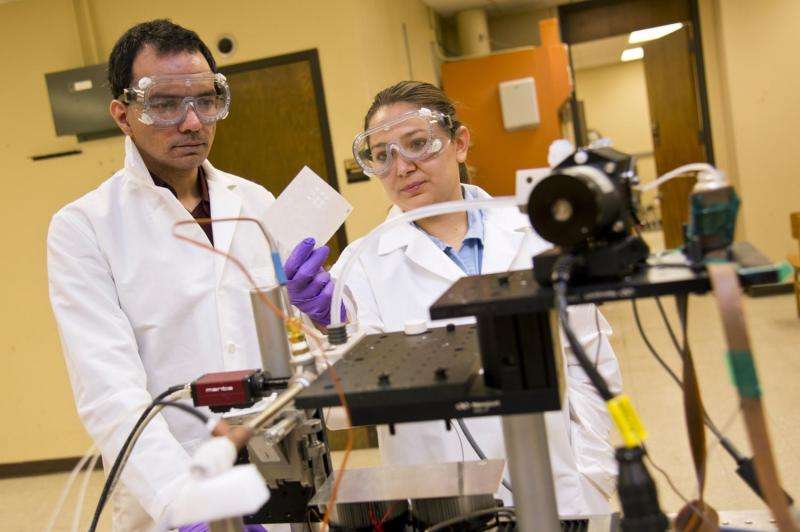Arun Giridhar, an associate research scientist in Purdue's School of Chemical Engineering, works with student Sierra Davis to operate a prototype system to dispense precise medication dosages tailored for specific patients, an advance in personalized medicine that could improve drug effectiveness and reduce adverse reactions. Credit: Purdue University photo/Steven Yang
A Purdue affiliated startup is commercializing a portable inkjet printer to produce precise, personalized medication dosages faster than traditional methods, which could improve overall drug effectiveness and decrease patient side effects.
Arun Giridhar, an associate research scientist in Purdue's School of Chemical Engineering, founded Pinpoint Pharma LLC to further develop and commercialize the technology based on research led by a team of multiple Purdue faculty and students.
Giridhar said there is a growing need for personalized medication and a better way to produce it.
"In healthy adults, by law, pharmacists are allowed to produce personalized medicine with a plus or minus 10 percent variation. This variance was legalized decades ago when there wasn't technology to improve that number; however, it's yet to be changed," he said. "Depending on the market pharmacists are in, there may or may not be health consequences to these variances based on the health, metabolism and size of the patient. In general, if you have a lot of size variation in your patients you can't make a one-size-fits-all drug. Personalized pharmaceuticals are more effective because they're based on each individual's makeup and have less side effects due to less variance."
Giridhar said the company completed market research to gain insights into the industry.
"We interviewed many pharmacists about the 10 percent variance and although a few didn't see too much of an issue, others thought it was clear that number needed to be a lot lower, with one pharmacist calling a 10 percent variance sloppy," he said. "We believe our technology will help pharmacists achieve more precision in personalized drug dosages and reach the best drug dose for the specified patients by closing the gap on that 10 percent variance, which will in turn reduce patient side effects and make the drug more effective."
PinpointPharama has developed an inkjet-like printer for medicine. Pharmacists key in a specific dose and the printer is able to take the drugs, in the quantity, mix and position as needed and print out precise, personalized medication.
"Compounding pharmacists or pharmacists in hospitals are developing personalized medication by hand, which includes calculating, weighing and packaging the material into a capsule or tablet. Our printer helps with production of the drugs, after the calculations have been completed, to achieve better precision and an increase in production rate," Giridhar said. "On average, a pharmacist takes 40 minutes to complete the production of the capsules, so filling and making the final dosage for whatever shape or form, our technology can reduce that to about three minutes."
Giridhar said even though the printer is able to drastically reduce production time, the main purpose is to provide better precision and increased personalized medicine so patients receive better treatment.
"We are focusing on certain patient segments that need a lot of individual tuning for size variation, which is our primary motivation for this technology," he said. "Our printer is not a 3-D printer, it's an inkjet printer so it is a lot simpler, easier to handle and a lot more reliable."
Pinpoint Pharma is building a market prototype after receiving nearly $50,000 through the Purdue Trask Innovation Fund.
"The research stage and research prototype is done and now we are building a market prototype to test with prospective customers," Giridhar said. "Once we get feedback we'll be able to further develop the technology and take it to market."
Provided by Purdue University
























